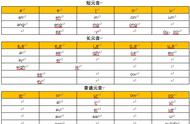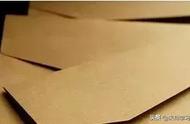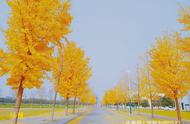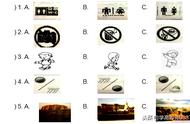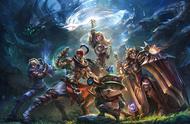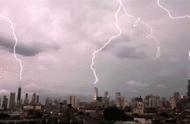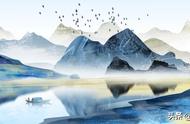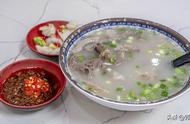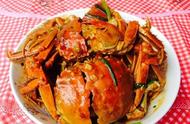
一般现在时
考点一:表示经常性或习惯性的动作,常与 often,usually,always,sometimes,every day等连用或根据上下文语境判断。
考点二:表示现在的情况或状态。
考点三:表示按照时刻表要发生的事情。
考点四:可表示客观事实或永恒的真理。
考点五:如果主句为一般将来时,在时间、条件状语从句中,用一般现在时表示将来。
一般将来时
考点一:表示将来要发生的动作或存在的状态,常与表示将来的时间状语 tomorrow,next time,in a few days,next Tuesday,in the future,in 时间段,soon,right away 等连用或根据上下文语境判断,其结构为“will 动词原形”。
考点二:“be going to 动词原形”表示将要发生的动作或安排、打算,或有某种迹象表明即将发生某事。
考点三:其他可表示将来的时态:
1. 现在进行时可表示计划或准备要做的事,且已经做好了准备;
2. 一般现在时可表示按计划要发生的事。如:
He is flying to London tomorrow.
The train from Beijing arrives at 6:35 a.m.
【考例链接】
单项选择
( )1. Sam _______ with his friends every weekend.
A. skates
B. is skating
C. has skated
D. was skating (2019 北京)
( )2. —I'm getting hungry. Do you know where we can get some good food?
—Of course! There _______ a restaurant around the corner.
A. will be
B. was
C. is (2019 山东临沂)
( )3. Susan and her sister _______ some photos in the park the day after tomorrow.
A. take
B. took
C. will take (2019 湖南益阳)
( )4. —Your father has gone to Shenzhen on business, hasn't he?
—Yes. And he _______ in two weeks.
A. will return
B. has returned
C. returned
D. returns (2019 广西百色)
( )5. Next week, each student in the class _______ a small gift from their teachers.
A. receives
B. received
C. will receive
D. has received (2019 重庆A卷)
现在进行时&过去进行时
现在进行时
考点一:表示现在正在进行的动作和发生的事,常与 now,at the moment,Look!,Listen!,Be quiet!,Hurry up!等连用或根据上下文语境判断。
考点二:表示现阶段或一段时间内正在发生的事,常与these days,all the morning等连用。
过去进行时
考点一:表示过去某一时刻或某一段时间正在进行的动作。常与at that time,at this time yesterday,then,all morning yesterday等时间状语或由when,while引导的时间状语从句连用或根据上下文语境判断。
考点二:由when引导的时间状语从句,若主句的动作正在进行,这时从句的动作发生了,则主句用过去进行时,从句用一般过去时。
考点三:由while引导的时间状语从句,当从句的动作正在进行,这时主句的动作发生了,则从句用过去进行时,主句用一般过去时。若主从句的动作在过去同时进行,则主从句均用过去进行时。
【考例链接】
单项选择
( )1. Amon _______ his ship in a big storm when a giant fish came out of the sea.
A. will sail
B. is sailing
C. was sailing
D. has sailed (2019 江苏苏州)
( )2. While the lights _______ to red, a car suddenly appeared around the corner.
A. change
B. have changed
C. were changing
D. will change (2019 天津)
( )3. Students in Grade Nine _______ a maths exam at this time yesterday.
A. take
B. are taking
C. were taking
D. have taken (2019 江苏宿迁)
( )4. Listen! The birds _______ in the trees outside our hotel.
A. sing
B. are singing
C. sang
D. were singing (2019 重庆B卷)
( )5. —Tom, what's your dad doing?
—He _______ my bike.
A. repairs
B. will repair
C. has repaired
D. is repairing (2019 北京)
一般过去时&现在完成时
一般过去时
考点一:表示过去发生的动作或存在的状态,常与the day before yesterday,yesterday,an hour ago,last week,just now,in 2016等连用或根据上下文语境判断。
考点二:表示过去的习惯或经常发生的动作,句中常有always,often,usually等频度副词。如:
She was often nervous when facing the camera as a child.
现在完成时(have / has done)
考点一:表示过去发生或已经完成的动作对现在造成的影响或结果,常与 already,just,yet,ever,never,before,so far,recently,in the past / last ... years / months 等连用或根据上下文语境判断。
考点二:表示过去某一时间开始并一直持续到现在的动作或状态,也许还要持续下去,该用法常适用于延续性动词,常与for 时间段或since 时间点或since引导的时间状语从句连用。
考点三:一些短暂性动词转换成意义相近的延续性动词或 be 形容词 / 副词 / 介词短语 / a(n) 名词,与表示一段时间的状语连用。如:
buy → have borrow → keep
move → live die → be dead
open → be open close → be closed
fall asleep → be asleep
leave → be away
come → be in / at
begin / start (电影等开始) → be on
join → be in 组织 / be a member in 组织
marry → be married
考点四:have / has been to 表示“到过某地(现在已经回来了)”,句中常有表示次数的词语 once,twice,three times等;have / has gone to 表示“去某地了(但还没有回来)”。
【考例链接】
单项选择
( )1. Melting ice (融冰) can cause sea levels to rise. Since 1993, sea levels _______ at a speed of 3.2 cm every 10 years.
A. rose
B. have risen
C. rise (2019 山东临沂)
( )2. —Wendy, how long have you had the Huawei P30 Pro?
—A couple of days. I _______ it last week.
A. bought
B. buy
C. will buy
D. have bought (2019 江苏南京)
( )3. He hasn't communicated much with his parents since he _______ a mobile phone last year.
A. got
B. get
C. gets (2019 广西桂林)
( )4. He _______ his English teacher when he was sightseeing in Paris.
A. has met
B. had met
C. met
D. would meet (2019 湖北武汉)
( )5. I ate some fruit, which I _______ since I was a child, and the vegetables from my garden.
A. have enjoyed
B. enjoyed
C. enjoy
D. had enjoyed (2019 湖北武汉)
动词的语态
动词的语态分为主动语态和被动语态。
考点一:被动语态由“be 及物动词的过去分词”构成(注意:以下用 done表示及物动词的过去分词),be有人称、数和时态的变化。
温馨提示:
《义务教育英语课程标准》要求掌握的被动语态有一般现在时的被动语态(am / is / are done),一般过去时的被动语态(was / were done)和一般将来时的被动语态(will be done)。现在完成时的被动语态及含有情态动词的被动语态对学有余力的同学来说也应了解,其构成分别为“have / has been done”和“情态动词 be done”。
考点二:使役动词(如 make,let 等)及感官动词(如hear,feel,watch,see等),在主动语态句子中后面接不带to的动词不定式(短语)作宾语补足语,在被动语态句子中后面要接带to 的动词不定式(短语)作主语补足语。
考点三:含有双宾语的主动语态句子变为被动语态句子时,如果直接宾语作句子的主语,那么间接宾语前需要加介词to或for。
考点四:被动语态用在一些固定句型中,如:
It is said that ...(据说……)
It is believed that ...(据信……)
It is well known that ...(大家知道……)
It is supposed that ...(据推测……)
考点五:有些词用主动语态表示被动意义。如:
The cloth washes well. 这布很耐洗。
The poem reads well. 这首诗读起来顺口。
【考例链接】
Ⅰ. 单项选择
( )1. Many teachers from cities _______ to the west provinces of our country to help the poor students there next year.
A. will send
B. are sent
C. will be sent (2019 黑龙江龙东地区)
( )2. —I’m tired of cleaning the house.
—Sweeping robots _______ more and more widely today. Why not buy one?
A. are used
B. were used
C. are using
D. used (2019 湖北孝感)
( )3. As we know, printing _______ during the Sui and Tang Dynasties in China.
A. invented
B. is invented
C. was invented (2019 广西桂林)
( )4. Look at the flowers on both sides of the streets. They _______ last month.
A. were planted
B. are planted
C. are planting
D. were planting (2019 广西河池)
( )5. —Tom is always careless with his schoolwork. Could you help him?
—No problem! I think he _______ to think twice before starting.
A. should be told
B. shouldn’t be told
C. should tell (2019 四川自贡)
综合训练
Ⅰ. 单项选择
( )1. —Linda has _______ to Paris. How can I get in touch with her?
—Don’t worry. She will call you as soon as she _______ there.
A. been; will get
B. been; gets
C. gone; will get
D. gone; gets (2019 四川眉山)
( )2. National Day celebrations for China’s seventieth birthday _______ in about three months.
A. will be held
B. will hold
C. is held
D. was held (2019 甘肃天水)
( )3. —Alex, why didn’t you answer my call at nine last night?
—Sorry, I _______ my mobile phone at home. I _______ basketball in the park with my friends.
A. forgot; played
B. forgot; was playing
C. left; played
D. left; was playing (2019 四川达州)
( )4. —Jeff, could you tell me if it _______ tomorrow? If it _______ tomorrow, I will stay at home.
—It’s reported that it will be sunny, let’s go camping on the Fenghuang mountain.
A. rain; rain
B. rains; rains
C. will rain; rains
D. will rain; will rain (2019 四川达州)
( )5. —May I speak to Mrs. Smith?
—Sorry, she _______ the clothes.
A. is washing
B. washes
C. wash (2019 湖南怀化)
( )6. —Hurry up!
—One moment. I _______ my e-mails and then I’m ready to go.
A. read
B. am reading
C. was reading
D. have read (2019 江西)
( )7. —I’ve never seen Mr. Taylor before.
—Don’t worry. I _______ him to you before the meeting.
A. will introduce
B. introduced
C. have introduced
D. had introduced (2019 江西)
( )8. —I called you last night, but nobody answered. Where were you then?
—Oh, I _______ my pet dog in my yard.
A. walked
B. was walking
C. am walking
D. will walk (2019 山东滨州)
( )9. Be quiet! The students _______ an English exam.
A. take
B. are taking
C. will take (2019 四川成都)
( )10. My English teacher took a photo of me while I _______ at the sports meeting.
A. run
B. was running
C. ran (2019 湖南湘潭)
( )11. —Have you ever _______ the Terracotta Army in Xi’an?
—Yes, I went there last year.
A. gone to
B. been to
C. been in (2019 湖南湘潭)
( )12. Tom said he _______ basketball with his classmates from 4: 00 to 6: 00 yesterday afternoon.
A. is played
B. was playing
C. plays
D. had played (2019 四川内江)
( )13. —Look! My mother _______ a new dress for me.
—Wow, it looks very nice on you.
A. is making
B. has made
C. will make (2019 福建)
( )14. When we _______ building the Subway Line 3, it will be easier to travel around the city.
A. finish
B. finished
C. will finish (2019 黑龙江哈尔滨)
( )15. She’s brought you some eggs. As you know, she _______ chickens.
A. keeps
B. will keep
C. has kept
D. kept (2019 湖北武汉)
( )16. I _______ abroad for several years, but I have never regretted my final decision to move back to my motherland.
A. am living
B. lived
C. have lived (2019 湖南长沙)
( )17. —My feelings for you have not changed.
—But you have changed. You are not as you _______.
A. are
B. were
C. will be
D. have been (2019 江苏扬州)
( )18. The China International Search and Rescue Team has brought help and hope to people in disasters around the world since it _______ 18 years ago.
A. set up
B. is set up
C. was set up
D. will be set up (2019 江苏南京)
( )19. In Chinese culture, children born in the Year of the Monkey _______ to be smart.
A. say
B. said
C. will be said
D. are said (2019 江苏盐城)
( )20. —Where will the 2022 Winter Olympics _______, Cindy?
—In Beijing, the capital of China, the first city to host both Summer and Winter Olympics.
A. be taken place
B. take place
C. take part
D. be taken part (2019 四川达州)
Ⅱ. 根据括号内的提示填空
1. As I was trying to find my way out, I suddenly _______ some noise. (hear) (2020 内蒙古呼和浩特)
2. In order to live in a better place, the natural environment must be _______ by all the people. (protect) (2020 内蒙古呼和浩特)
3. This novel is very interesting. My brother _______ (read) it three times. (2020 黑龙江绥化)
4. The storybook can _______(not take) out of the reading room. (2020 湖北鄂州)
5. Some of the world’s greatest books _______(write) long ago. (2020 黑龙江大庆)
6. I was watching TV while my parents _______(chat) on the WeChat. (2020 湖北鄂州)
7. Rubbish _______(separate) into groups in many other cities now, following the practice in Shanghai. (2020 江苏泰州)
8. A new big park _______(build) in our city next year. (2020 甘肃武威)
9. The electric light was _______(发明) by Edison (爱迪生). (2020 广西桂林)
10. In ancient times, food was _______(存储) up for winter. (2020江苏苏州)
11. Our school is going to _______(修建) a new library next month. (2020 新疆维吾尔自治区 新疆生产建设兵团)
参考答案:
中考语法专项复习(九)动词的时态、语态专讲专练
动词的时态
一般现在时&一般将来时 1—5 ACCAC
现在进行时&过去进行时 1—5 CCCBD
一般过去时&现在完成时 1—5 BAACA
动词的语态
1—5 CACAA
综合训练
Ⅰ. 1—5 DADCA 6—10 BABBB 11—15 BBBAA 16—20 BBCDB
Ⅱ. 1. heard 2. protected 3. has read 4. not be taken
5. were written 6. were chatting 7. is separated
8. will be built 9. invented 10. stored 11. build
写在最后
整理不易,如果觉得不错的话,请分享给更多需要的人,谢谢大家对我们的支持!老师们需要哪些学习资料可以在下方留言告诉我哦~
来源 | 本文节选自《英语周报》,仅供分享,版权归原作者及原出处所有,如涉及版权等问题,请及时与我们联系。
责编 | 李晨晖 审稿 | 张俊 校稿 | 尚继明






